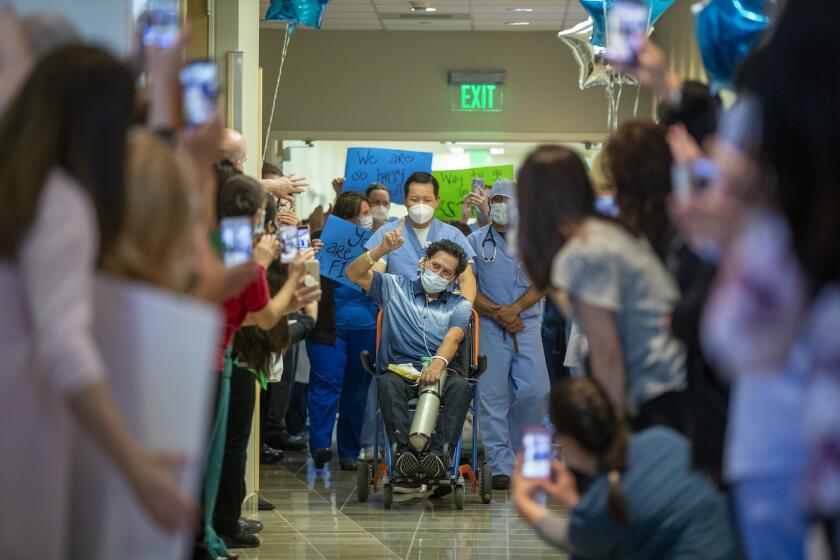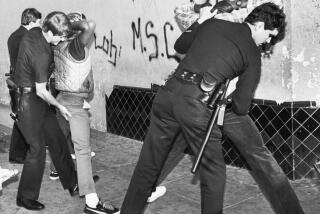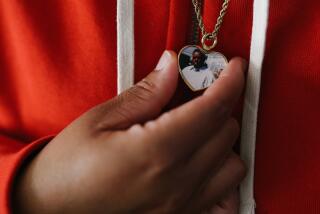Cut off from their kids, parents of juvenile detainees wait and worry as coronavirus spreads
- Share via
It was the phone call Domonique had been dreading, the one that seemed inevitable.
Her 19-year-old son was on the other end of the line, calling from inside Barry J. Nidorf Juvenile Hall in Sylmar.
“Mom, one of the boys in the unit underneath me has the coronavirus,” he said.
It remains unclear whether the rumor was true, but the panic Domonique felt with no way to check on her asthmatic son was very real. Two days later, The Times obtained a document that revealed a probation officer who works at Nidorf had tested positive for the coronavirus. As a result, 21 youths were placed under quarantine.
Fears of a coronavirus outbreak in county and state lockups have sparked efforts across California and the nation to lower the adult prison and jail populations in recent weeks, with thousands of nonviolent offenders and those nearing the end of their sentences being released early.
But policies for early release of juveniles are more complicated, leaving hundreds of young detainees and staff in environments where an outbreak could spread rapidly.
Los Angeles County detention centers have barred in-person family visits and those of community-based organizations. With limited contact, many parents who spoke to The Times on the condition of anonymity said they feel unable to protect their kids during a pandemic. Advocates and attorneys, meanwhile, say they face barriers such as court closures preventing them from arguing for the release of their clients.
“There’s a real disconnect … between what we are hearing at every level of state government, county and city, compared to what’s going on in the Probation Department and the juvenile courts,” said Jerod Gunsberg, a Los Angeles defense attorney. “There is just not the same sense of urgency.”
The situation in juvenile halls is a microcosm of the broader struggle across the country to balance public safety against public health. The infection of more than 200 people in New York City jails has highlighted the virus’ potential to spread rapidly through incarcerated populations.
In California, a group of advocates and defense attorneys has called for the release of all juveniles awaiting trial or being held on technical probation violations. The Legal Aid Society in New York City has sued for the release of several youths 13 to 17 years old who are being held by a child welfare agency. The Pennsylvania Supreme Court received a petition Wednesday asking for the release of nearly 2,000 juvenile defendants, many of whom are considered medically fragile.
Advocates are concerned that incarceration during the pandemic — as well as isolation or quarantine in their rooms — could also endanger children’s mental health because of the prolonged separation from their families.
“We know that kids do better when they are connected with their families,” said Michael Umpierre, director of the Center for Juvenile Justice Reform at Georgetown University. “In this context, it’s really challenging because you have the public health concerns, but you have to figure out a way to keep families engaged in the process in the meantime.”
For those serving time in county jails, sheriffs have the authority to release inmates early in an emergency. The L.A. County jail population, typically about 17,000 people in custody, is now fewer than 14,500.
But attempts to enact a broad release of juvenile inmates in Los Angeles County have been blocked by court officials, according to a person with knowledge of the matter who spoke on the condition of anonymity in order to discuss the issue candidly.
During a meeting of attorneys and court officials late last month, some raised the idea of trying to identify young detainees who could be eligible for release, including nonviolent offenders, youths with compromised immune systems or those nearing the end of their sentences, the source said.
But the initiative was blocked by L.A. County Superior Court Judge John C. Lawson, who oversees Delinquency Court, the source said. Lawson said juvenile releases would continue to be determined on a case-by-case analysis, depending on the youth’s conduct and performance during custody programs.
Lawson was not available for an interview, Mary Hearn, a spokeswoman for the court, said.
“We recognize the urgency of protecting these youths,” Hearn said in an email. “We are working with our juvenile justice partners to identify minors for release to slow the spread of COVID-19 in county juvenile facilities.”
These are some of the unusual new scenes across the Southland during the coronavirus outbreak.
Adam Wolfson, communications director for the L.A. County Probation Department, said the agency is actively working to reduce its juvenile population.
“We continuously screen for early release due to youths meeting their treatment goals,” he said. “Those that meet eligibility criteria will be sent to court with a recommendation for release; however, only the court can authorize a release.”
L.A. County juvenile halls and camps now hold 677 youths, a significant decrease from the 2,455 youths held in county facilities in 2012, records show. But at least 285 of those in custody are still awaiting trial, a group advocates argue should be released because of the virus.
The vast majority of children living in the facilities are black or Latino boys, county records show. Children in the juvenile justice system are more likely to have experienced trauma, which can be linked to poor health outcomes, said Samantha Buckingham, the director of the Juvenile Justice Clinic at Loyola Law School.
Last month, probation officers began “verbally screening” anyone entering a juvenile facility and turning away those with symptoms that could be linked to a respiratory illness. Young people newly entering county custody are also undergoing health screenings.
“Youth and staff in Probation facilities are practicing social distancing strategies when feasible by limiting groups, assigning beds that can provide additional space between individuals, rearranging scheduled movements to minimize mixing of individuals from different housing areas, and utilizing social distancing during recreation,” the Probation Department said in a statement.
Wolfson said probation officers are limiting the congregation of youths to groups of six or less, having them shower individually and staggering meal times to prevent large groups from gathering in mess halls.
Complaints coming from inside the juvenile facilities, however, paint a different picture.
An 18-year-old being held at an L.A. County juvenile camp, who requested anonymity for fear of retribution, told The Times that physical distancing is nearly impossible where he’s being housed. Youths still shower in groups as large as seven and sleep in tightly spaced beds, according to the teen, who said he turns his head away from others, fearing someone may cough or sneeze in his face.
With nearly all educational and counseling programs on hold, he said, residents of the camp spend most days in their beds or in a recreational room that houses a television and a PlayStation 4 console. But the room is not large, and teens often end up sitting shoulder to shoulder on a couch or sharing the same video game controller.
Surgical masks and gloves have been handed out inside the facility, he said, but only to probation staff.
“They don’t want them to get it, but why can’t they help us? They’re just helping their staff, like we not nobody here,” the teen said. “They take care of them more than us.”
Probation officials did not respond to questions about the boy’s description of conditions at the camp.
His concerns echoed those shared in a recent letter sent to the L.A. County Department of Public Health by a number of defense attorneys and criminal justice reform groups.
“The most pressing concerns are system-wide reports that social distancing is not being enforced by probation officers who supervise the children,” the letter said. “At the probation camps, it is our understanding that youth are still housed in crowded dormitory settings and that the ‘six foot rule’ is neither explained nor enforced.”
Gunsberg, the defense attorney, said there is no purpose in continuing to detain nonviolent teens while most educational, counseling and job training programs are on hold because of the coronavirus outbreak.
“The whole point of the juvenile justice system is rehabilitation … so if there’s no rehabilitative purpose, what are they doing?” he asked. “Wouldn’t they be better off at home?”
The detention officer’s email described “chaos” inside one of Los Angeles County’s juvenile halls.
Some parents complain that they have received little information from probation officials, worsening their stress.
Domonique said she was unaware a public defender assigned to the Sylmar Juvenile Court had tested positive for the coronavirus until she was contacted by The Times. Neither probation officials nor the public defender’s office have answered questions about whether the attorney had contact with detainees.
Domonique, who is a healthcare provider, said her son has been largely keeping to himself in recent weeks, fearful that anyone he contacts could be infected. After she heard that a public defender and a probation officer connected to the Sylmar hall had both become sick, the hours between phone calls from her son have become agonizing.
“If I don’t hear from him, I’m like, is he OK? What is he doing? Why hasn’t he called me? Did my baby get sick?” she said.
The concern goes both ways. Gabriela, whose 18-year-old son is housed in the Sylmar juvenile hall, said she’s told him about how parks and movie theaters have closed because of the pandemic. She has assured him that she’s exercised care, as have his father and sister, not to leave the house unless it’s necessary.
“He’s very depressed and worried about us, because he hasn’t been able to see us,” she said.
For some parents, recent developments at Sylmar have been bittersweet. One of them, Yolanda, said she felt a huge relief when she learned that her son might be released soon because of the virus.
But after she heard about the infected probation officer, the mother’s joy quickly turned to anxiety.
“I hope that my son won’t bring the virus home,” she said.
More to Read
Sign up for Essential California
The most important California stories and recommendations in your inbox every morning.
You may occasionally receive promotional content from the Los Angeles Times.














